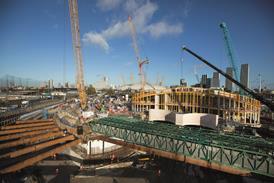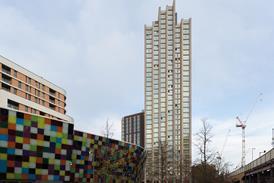- News
Regulations latest
All the latest updates on building safety reform
- Focus
- Comment
- Data
- Programmes
- CPD
- Events
- Jobs
- Subscribe
- Building Boardroom
Why are contractors neglecting scope 3 emissions? It’s complicated…

Carbon emitted by materials and transport accounts for up to 98% of contractors’ emissions, but a new report has found an alarming lack of attention given to the issue by some of the UK’s biggest contractors
How well is the construction industry really doing when it comes to reducing its carbon emissions? It is fair to say that sustainability is pretty high on the agenda for any built environment firm worth its salt, driven partly by clients and the changing requirements of building occupiers.
There is now barely a tier 1 contractor without an entire team of staff dedicated to measuring carbon and drawing up net zero pathways. Great strides have been made in the past few years to laser-focus the sector on cutting its emissions. Or have they?
Last month the UK Green Building Council (UKGBC) published research showing that the industry needed to decarbonise twice as fast as it currently is if it is to stay on track to meet government targets. Between 2018 and 2022, emissions from the UK built environment fell by 13%, well below the 19% required to meet a gateway target in 2025.
This target is part of the UKGBC’s Net Zero Whole Life Carbon Roadmap, a pathway agreed with more than 100 organisations, including government departments. It sets out the progress which needs to be made annually in order to hit the government’s goal of getting emissions down by 78% by 2035.
On the face of it, a reduction of 13% in four years might sound quite impressive. But most of that came from operational energy, and a lot of that is reliant upon decarbonisation of the grid rather than any actual progress made by construction firms.
When it comes to embodied carbon – the emissions from the production and transport of materials in projects, which make up the vast majority of contractors’ total emissions – the reduction over four years was just 4%. This is less than a quarter of what the UKGBC’s roadmap called for.
…
This is PREMIUM content, available to subscribers only
You are not currently logged in. Subscribers may LOGIN here.
SUBSCRIBE to access this story

SUBSCRIBE for UNLIMITED access to news and premium content
A subscription will provide access to the latest industry news, expert analysis & comment from industry leaders, data and research - including our popular annual league tables. You will receive:
- Print/digital issues delivered to your door/inbox
- Unlimited access to building.co.uk including our archive
- Print/digital supplements
- Newsletters - unlimited access to the stories behind the headlines
Subscribe now
Get access to premium content subscribe today



















